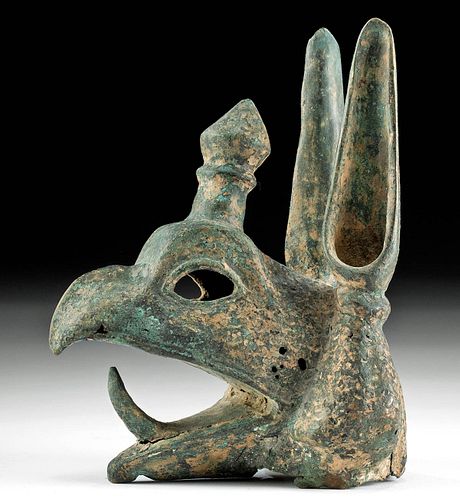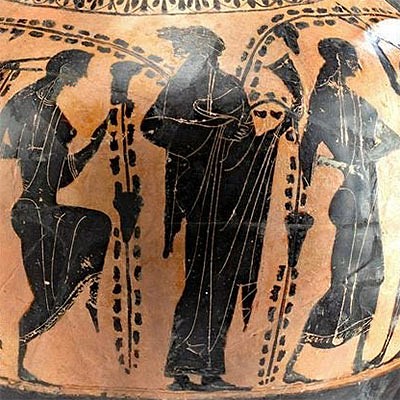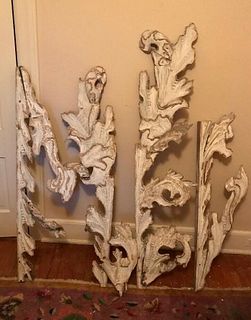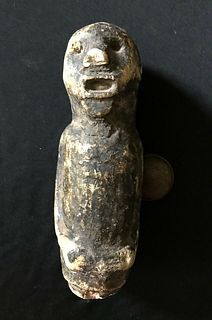Superb Greek Archaic Bronze Protome Head of Griffin
Lot 28
About Seller
Artemis Fine Arts
686 S Taylor Ave, Ste 106
Louisville, CO 80027
United States
Selling antiquities, ancient and ethnographic art online since 1993, Artemis Gallery specializes in Classical Antiquities (Egyptian, Greek, Roman, Near Eastern), Asian, Pre-Columbian, African / Tribal / Oceanographic art. Our extensive inventory includes pottery, stone, metal, wood, glass and textil...Read more
Estimate:
$55,000 - $75,000
Absentee vs Live bid
Two ways to bid:
- Leave a max absentee bid and the platform will bid on your behalf up to your maximum bid during the live auction.
- Bid live during the auction and your bids will be submitted real-time to the auctioneer.
Bid Increments
| Price | Bid Increment |
|---|---|
| $0 | $25 |
| $300 | $50 |
| $1,000 | $100 |
| $2,000 | $250 |
| $5,000 | $500 |
| $10,000 | $1,000 |
| $20,000 | $2,500 |
| $50,000 | $5,000 |
| $100,000 | $10,000 |
| $200,000 | $20,000 |
About Auction
By Artemis Fine Arts
Jun 10, 2021
Set Reminder
2021-06-10 10:00:00
2021-06-10 10:00:00
America/New_York
Bidsquare
Bidsquare : Exceptional Antiquities | Asian | Ethnographic
https://www.bidsquare.com/auctions/artemis-gallery/exceptional-antiquities-asian-ethnographic-7012
Museum-worthy examples of Egyptian, Greek, Roman, Viking, Near Eastern, Far East / Asian, Pre-Columbian, African / Tribal, Oceanic, Native American, Spanish Colonial, Russian, Fossils, Ancient Jewelry, Fine Art, so much more! Artemis Fine Arts info@artemisgallery.com
Museum-worthy examples of Egyptian, Greek, Roman, Viking, Near Eastern, Far East / Asian, Pre-Columbian, African / Tribal, Oceanic, Native American, Spanish Colonial, Russian, Fossils, Ancient Jewelry, Fine Art, so much more! Artemis Fine Arts info@artemisgallery.com
- Lot Description
Ancient Greece, Archaic Period, ca. 7th to 6th century BCE. A striking bronze protome cast as a griffin, with the head of an eagle and incised scales and open beak with curled, pointed tongue. The eyes are openwork with raised eyelines around the lobes which may have contained bone inlays. A finial with a knob is set on the brow, and further back on the head are dramatic, pointed ears. This griffin head perhaps rested atop a sinuous neck that attached to the side of a cauldron. The griffin (or gryphon) is a beast with the head and wings of an eagle and the body of a lion. According to Graeco-Roman mythology, griffins lived in the Rhipaean Mountains of Scythia and guarded rich gold deposits. A wonderful green patina envelops this fantastical beast. Size: 5" L x 3.5" W x 5.8" H (12.7 cm x 8.9 cm x 14.7 cm)
The griffin, half eagle and half lion, was a fierce symbol of divine power. The tradition was long lasting - we know of examples from ancient Iran and Egypt that are from ca. 3000 BCE - and the animal continued to appear in classically-inspired art into the early modern period.
Offerings to gods often consisted of impressive bronze vessels or cauldrons that were embellished by protomes featuring guardian heads riveted to the rims.
For a similar example please see the Metropolitan Museum of Art, accession number: 59.11.18.
This piece has been searched against the Art Loss Register database and has been cleared. The Art Loss Register maintains the world’s largest database of stolen art, collectibles, and antiques.
Provenance: private New York, USA collection; ex-private collection, acquired on the German art market in 2001
All items legal to buy/sell under U.S. Statute covering cultural patrimony Code 2600, CHAPTER 14, and are guaranteed to be as described or your money back.
A Certificate of Authenticity will accompany all winning bids.
We ship worldwide and handle all shipping in-house for your convenience.
#164981Fragment of a larger piece as shown. Perforations and piercings through sides, mouth and top. Mineral and earthen deposits on interior and exterior. Surface pitting and chips to high pointed areas. Great preservation of overall form and rich green patina.Condition
- Shipping Info
-
All shipping is handled in-house for your convenience. Your invoice from Artemis Gallery will include shipping calculation instructions. If in doubt, please inquire BEFORE bidding for estimated shipping costs for individual items.
-
- Buyer's Premium



 EUR
EUR CAD
CAD AUD
AUD GBP
GBP MXN
MXN HKD
HKD CNY
CNY MYR
MYR SEK
SEK SGD
SGD CHF
CHF THB
THB















